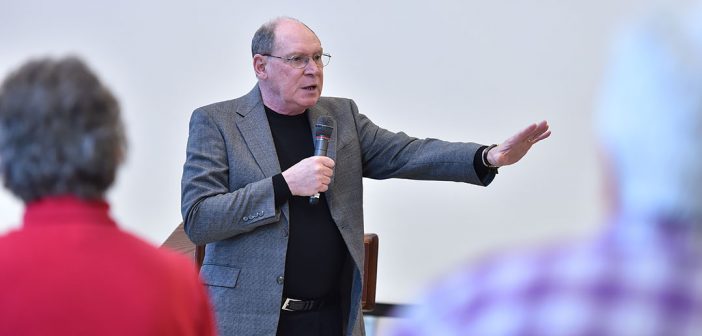People who become doctors, nurses, social workers, ministers, and other “helpers” typically enter their fields because they want to improve others’ lives. Often, though, these professionals serve at the expense of their own health and wellbeing.
Taking time to deal with the stress and anxiety that accompany helping professions is imperative, said Robert J. Wicks, PsyD, at the Graduate School of Religion and Religious Education (GRE) on March 6.
“Severe secondary stress is dangerous,” said Wicks, a professor of pastoral counseling at Loyola University Maryland and an expert on secondary stress and trauma in caregivers.
“For every case of someone who is experiencing severe secondary stress, there are a least a dozen others on the edge of some form of secondary stress.”
Wicks told an audience of chaplains, therapists, and students of pastoral care and counseling that secondary stress is a reality they must face within their chosen careers. Also called vicarious trauma, this stress is a kind of “emotional residue” that comes from constantly witnessing pain and suffering.
“We run the risk of catching others’ sense of despair,” he said.
Wicks headlined a GRE conference that borrowed its name from his bestselling book, Riding the Dragon: 10 Lessons for Inner Strength in Challenging Times (Sorin, 2003). He discussed five red flags that portend burnout and secondary stress:
1. Becoming over-involved in others’ emotions: Empathy is vital to establishing rapport with patients or parishioners, said Wicks. However, mental health professionals and ministers must avoid becoming emotionally entangled in patients’ distress. Otherwise, counselors and clients alike will be incapacitated by their pain.
“The seeds of caring and the seeds of burnout are the same seeds,” Wicks said.
2. Acute secondary stress: No matter how much care one takes to maintain an appropriate emotional distance, this isn’t possible 100 percent of the time, he said.
He recalled a recent session when a patient was recounting the horrors of war she endured. Before he knew it, Wicks found himself gripping the arms of his chair.
“I do darkness for a living, yet I find that if I let my guard down, I’m in trouble,” he said.
3. Chronic secondary stress: Wicks said that communications theorist Marshall McLuhan once posed the question, “If the temperature of the bath rises one degree every ten minutes, how will the bather know when to scream?”
“Many of us don’t know when to scream,” Wicks said.
Members of helping professions hold themselves to high standards, expecting to care for all people all the time, he said, while also balancing a heavy workload.
It is imperative to practice self-care as a means to deal with the stress, anxiety, and even trauma that one inevitably experiences in this profession.
4. Getting caught up in colleagues’ anger, hurt, and fragility: Every parish or clinical setting has jaded employees, said Wicks. These people deserve compassion, because their anger is often a cover for deeper pain. However, he cautioned that helping professionals should not “give your joy away” to them, or else they risk contracting their negativity.
5. Confusing the “five levels of critical”: A surefire route to burnout is mismanaging priorities, Wicks said. He advised organizing work and life according to five levels:
- Critical now: urgent tasks and situations
- Critical in the long-run: self-care, maintaining friendships, etc.
- Critical for others: tasks and favors others ask of you, which you must triage according to your availability and limitations
- Not critical: the overflowing email inbox, the pile of papers on your desk—these must be done, but they can be “zipped through” to get them out of the way
- Critical not to do: tasks you decide ahead of time you will not do—in other words, boundaries. “Be aware of [your boundaries],” Wicks said. “If you give in when you’re exhausted, feeling unappreciated, or experiencing stress… you’re going to hurt yourself and someone else.”





